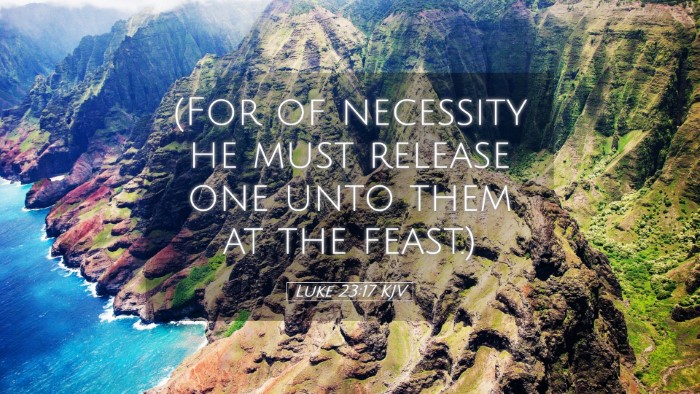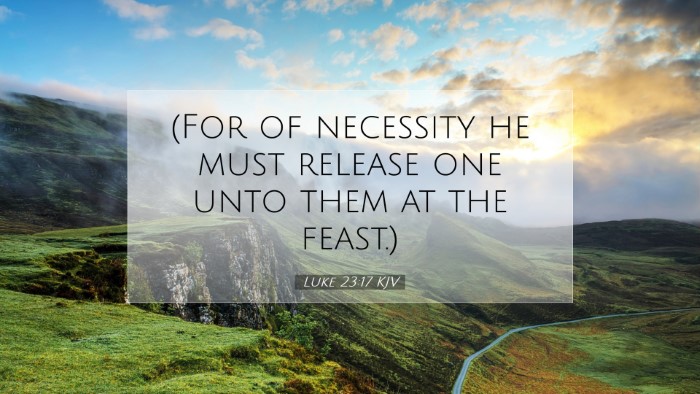Bible Commentary on Luke 23:17
Verse Context: Luke 23:17 states, "For of necessity he must release one unto them at the feast." This verse is often referenced in the context of the trial of Jesus and the subsequent choice given to the crowd between Jesus and Barabbas. Understanding this verse requires a deeper exploration of its implications within the narrative of the Gospel, as well as its theological significance.
Exegesis and Historical Background
In Luke 23:17, we find ourselves at a crucial moment in the Passion narrative. The context is the trial of Jesus before Pontius Pilate, where there is an annual tradition during Passover when the Roman governor would release a prisoner to the people. This practice is emblematic of both the Jewish custom and the Roman legal system. The crowd is given a choice between releasing Barabbas, a notorious criminal, or Jesus, whom Pilate acknowledges as innocent.
-
Matthew Henry: Henry emphasizes the contrast between Jesus and Barabbas, highlighting how the choice reflects the condition of humanity, often choosing sin and rebellion over righteousness and truth. He notes the irony that the very people who should have recognized Jesus as the Messiah instead called for His crucifixion, illustrating the depths of sin and the rejection of divine grace.
-
Albert Barnes: Barnes places importance on the phrase "of necessity," indicating that this was not merely a political maneuver but a divine appointment in God's redemptive plan. It was necessary for one to be released, pointing to the concept of substitution, where Jesus ultimately becomes the substitute for humanity in His atoning sacrifice.
-
Adam Clarke: Clarke suggests that this practice of releasing a prisoner was to ingratiate the Roman authorities with the Jewish populace, further emphasizing the manipulation inherent in Pilate’s actions. He provides insights on the cultural significance of this tradition, showing how it plays into the broader narrative of how the Jews interacted with their Roman oppressors.
Theological Implications
The choice of Barabbas over Jesus invites profound theological reflection. This moment highlights several key concepts in salvation history:
-
Substitutionary Atonement: The decision to release Barabbas instead of Jesus serves as a poignant foreshadowing of the atoning sacrifice Christ was to make. Just as the innocent Jesus is exchanged for the guilty Barabbas, so too is the righteousness of Christ offered in exchange for the sinfulness of humanity.
-
The Nature of Choice: The crowd's choice reflects the general human inclination toward sin and away from righteousness. This theme resonates throughout Scripture, as people are often seen choosing temporary pleasures over eternal truths. The concept of free will is highlighted here, demonstrating how people can, at times, refuse the divine for the sake of the worldly.
-
Divine Sovereignty: While the crowd exercised their choice, God's sovereignty remains intact. As noted by Barnes, the necessity of the situation aligns with God's redemptive plan. This brings forth the mystery of divine providence—how human actions can serve God's purposes, even when they appear to contradict His revealed will.
Lessons for Believers
This verse and its context offer significant lessons for pastors, students, theologians, and Bible scholars:
-
Recognition of Christ: It is essential for believers to continually recognize Christ in their lives and the choices they make. As the crowd failed to acknowledge Jesus' true identity, it serves as a warning for modern believers to not overlook the work of Christ amid pressures and distractions of the world.
-
Awareness of Cultural Influences: Just as the crowd was swayed by cultural and societal pressures, so too must modern believers be discerning about the influences around them. The interplay between faith and culture requires vigilance and deep engagement with Scripture.
-
Hope in Redemption: The narrative ultimately leads to the realization that Jesus’ sacrificial death and resurrection provide hope for all humanity. Believers are encouraged to reflect on the incredible mercy that transforms lives, as seen in the exchange of Barabbas for Christ.
Conclusion
Luke 23:17 serves as a critical moment in the final hours of Jesus’ earthly ministry. The interplay between choice, grace, and redemption culminates in a vivid portrayal of the human condition and the absolute necessity of Christ's sacrifice. By understanding this verse within its broader narrative and theological framework, believers are equipped to delve deeper into the profound mysteries of faith and the character of God. The insights gleaned from esteemed commentators help reinforce the significance of tradition, the sovereign plan of God, and the call to personal accountability in recognizing the Savior whom many have failed to accept.


